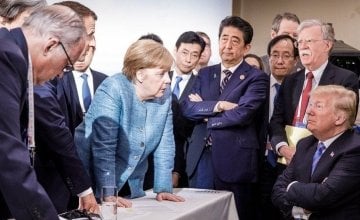
Read our 2023 annual report

Knowledge Hub
What is the G7 and why is it important in 2021?

This summer the UK will host the G7, here we explain what the G7 is and why this meeting is important.
What is the G7?
The Group of Seven more commonly known as the G7 is an organisation made up of: Canada, France, Germany, Italy, Japan, the United Kingdom and the United States.
What is the purpose of the G7?
The G7, originally G8 (before Russia was uninvited), was set up in 1975 as an informal forum of leaders from the world’s most advanced economies. The G7 holds annual summits and are a platform that can shape political responses to global challenges. Because of their wealth and power the group is positioned to make things happen around the world.
What has the G7 achieved?
The G7 claims that it has taken action to strengthen the global economy, save 27 million lives from AIDS, tuberculosis and malaria, and supported the education of millions of children in the poorest countries. In 2015 its members led the way in helping secure the historic Paris Climate Agreement to limit global emissions.
When and where does the G7 take place?
The summits are held annually, and hosted on a rotation basis by the group's members. This year the UK holds the G7 presidency so it is the turn of Prime Minister Boris Johnson to host the event in June. The world’s leaders will be gathering in Cornwall at Carbis Bay, near St Ives.
Why is the G7 important this year?
Because of the coronavirus pandemic the 2020 summit was cancelled. So 2021 is important leaders are going to address shared challenges like Covid-19 and climate change
What is on the G7 agenda?
The government’s priorities are yet to be finalised but the Uk’s G7 website states that the Prime Mister will ask leaders to seize the opportunity to build back better from coronavirus, uniting to make the future fairer, greener and more prosperous. We are also coordinating a group of NGOs in developing recommendations for the UK government on using the G7 Presidency to lead the way in tackling food insecurity and malnutrition.
We are hoping that hunger and nutrition will feature as part of building back better and making a fairer future. Back in 2015 they made a commitment to lift 500 million people in developing countries out of hunger and malnutrition by 2030. With news that the economic impact of Covid has exacerbated food shortages in many parts of the world, now is not the time to deprioritise the challenge of tackling hunger.
Join thousands of others who campaign with us for effective aid that helps the world's poorest people.
Other ways to help
Corporate support
Is your company interested in working together for a common cause?
Fundraise for Concern
From mountain trekking to marathon running, cake sales to table quizzes, there are lots of ways you can support our work.
Buy a gift
With an extensive range of alternative gifts, we have something to suit everybody.
Leave a gift in your will
Leave the world a better place with a life-changing legacy.
Volunteer with Concern
The lots of ways to get involved with our work as a volunteer
School fundraising
Without the generous support from schools, we wouldn't be able to do the work that we do.

